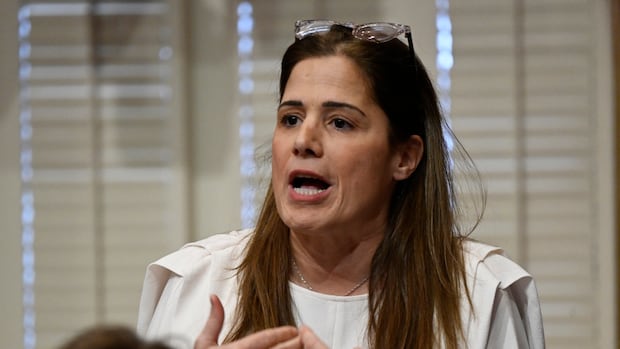[
A Quebec government-commissioned investigation into the campus climate at Dawson and Vanier colleges is recommending the adoption of a law to “oversee academic freedom in the college system” with the aim of reducing tensions among students.
The report published Friday, after it had first appeared in the Journal de Montréal, found that the principles of secularism are not being followed at both colleges.
It raised several issues linked to student associations and religious accommodations and points to the availability of prayer rooms for fuelling a “climate of radicalization, community withdrawal” and mistrust at the junior colleges (CEGEPs).
Quebec Higher Education Minister Pascale Déry called for the investigation in November 2024, following complaints from students who said they felt unsafe because of tensions stemming from the ongoing conflicts in the Middle East.
The investigation, which consists of nearly 50 interviews with administration members of both colleges, was completed in June.
Déry said in a news statement on Friday that the report highlights failings, which have “deeply undermined the climate at both colleges, fuelled tensions and weakened community life.”
“As a government, we cannot tolerate our campuses becoming a scene of division,” she said.
“Attending an educational institution in a healthy and safe environment is not a privilege; it is a right, and this right is non-negotiable.”
Minister ‘inventing problems to solve,’ teachers’ group says
Yves de Repentigny, who represents a teachers’ group, blasted the report, saying it deviated from its original mandate and that Déry was “inventing problems to solve.”
“The report was about the safety and security of students in Vanier and Dawson college, and well, it turned out that every bylaw, that every collective agreement had been respected,” said de Repentigny, vice-president of the Fédération nationale des enseignantes et enseignants du Québec (FNEEQ).
He noted that tensions may arise in CEGEPs because junior colleges are part of higher education, where students are taught to confront values and opinions that differ from their own.
“If you cannot learn to cope with disagreement and tensions in CEGEPs, where can you learn that?” he said.
A new report from Quebec’s Ministry of Higher Education looking into tensions at Dawson College and Vanier College says some student groups and religious accommodations may be partly to blame.
De Repentigny said that in 2022, the FNEEQ wanted CEGEPs to be covered under Quebec’s Bill 32 to guarantee academic freedom because college departments should remain as “autonomous as possible” when it comes to designing course content and teaching.
But he noted that the organization “wouldn’t work on that with the current minister” because the FNEEQ has lost all confidence in Déry and is asking for her to resign.
In a joint statement issued Friday afternoon, Dawson and Vanier said they were surprised to receive the report after it was shared with the media, adding that they are still in the process of conducting a thorough analysis.
“We reaffirm our strong commitment to our educational mission and our responsibility to develop engaged and curious citizens capable of dialogue,” said the statement.
‘Climate of suspicion’
Faculty, students and student associations at Dawson and Vanier have been experiencing friction linked to the Israel-Palestinian conflict since 2023, the report says.
The report suggests the interpretation of academic freedom at the colleges has caused a “climate of suspicion and the creation of cliques among professors,” which could negatively impact educational services and students.
Tensions at the colleges have manifested through conferences, student newspapers, such as the Plant at Dawson College, and some clubs promoting the use of a keffiyeh, according to the report, which notes that the distinction between cultural and religious elements of some student clubs is unclear.
Student associations at Dawson and Vanier are responsible for organizing activities and promoting the social, cultural and recreational interests of students.
However, according to the report, activities organized by student clubs “foster the formation of cliques that exclude some students who do not share the same goals.”
“This situation creates tensions that give rise to complaints,” the report reads. “Moreover, some clubs also display their affiliation with sociopolitical activist movements in the context of the Israeli-Palestinian conflict.”
Christopher Zéphyr, the president of the Fédération étudiante collégiale du Québec, which represents students across CEGEPs, said it was “deplorable” for the government to suggest that an institution dictate the inner workings of a student association.
He also pointed to a commission currently studying secularism in CEGEPs.
“No matter the conclusions of that commission, for me, it’s important they respect accessibility to higher education,” said Zéphyr.
“A common prayer room for everyone is an accessibility measure and was actually put forward as a solution by student groups.”
Report recommends faculty member join student paper
The report recommends that the law on the accreditation and financing of student associations be updated to give institutions the necessary tools to intervene in “problematic situations” and putting in place mechanisms to ensure the adherence to the province’s secularism law.
To address unclear evaluation criteria in some classes, the report recommends a review of skill requirements for language courses while taking into account “departmental responsibilities, academic freedom and the teaching context in colleges.”
For Dawson specifically, the report recommends that at least one faculty member join the editorial team of the college’s student newspaper.
“This practice had been previously discontinued at the request of the student association at the time,” a spokesperson for Dawson wrote in the joint statement, saying they will review this particular recommendation.
The report also recommends that Vanier establishes official criteria for choosing guest speakers and topics for conferences. In the statement, a spokesperson for Vanier said it welcomed the recommendation.
Diane Gauvin, director general of Dawson College, said in an email earlier Friday that the administration is reading the report carefully.
“The report contains many elements, including recommendations for which colleges have little or no control, as well as others that would impact all CEGEPs,” Gauvin said.

